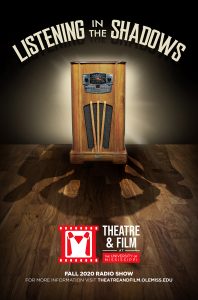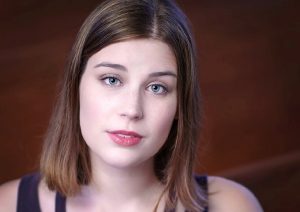
‘Listening in the Shadows,’ the first production of the season for Theatre and Film at UM, opens Friday (Oct. 30). Because of ongoing health concerns, the production will be presented virtually via YouTube and Facebook.
OXFORD, Miss. – Journey back to the Golden Age of Radio with “Listening in the Shadows,” the first production of the season for the University of Mississippi Department of Theatre and Film.
This series of five original radio plays written and performed by Ole Miss students arrives just in time for Halloween – which is appropriate for the spooky, noir-esque style of the dramas.
“Listening in the Shadows” premieres online at 7 p.m. Friday (Oct. 30) on YouTube and Facebook; the Facebook premiere will feature an interactive “listen party.” Besides the livestream production, individual dramas will be released on “Stage & Screen,” the department’s new podcast.
Matthew Shifflett, instructional assistant professor of theatre arts, initially conceived of the radio plays as a way to safely create a work of theater within the guidelines and restrictions resulting from the ongoing pandemic. But his experiences teaching playwriting also led him to believe that a project such as this could help meet a creative need for student playwrights.
“One thing I’ve noticed over time is that a lot of students are turning in scripts that I don’t know how you’d stage,” Shifflett said. “A lot of them are very interested in genre fiction, fantasy kind of stuff.
“I made it a policy in my class to never push back, but to say, ‘Go for the weird thing that’s creative’ because you can figure out the practicality later. You can accomplish a lot of things over radio that you can’t accomplish on stage.”
Shifflett developed a theme for the series – the shadow, an homage to the classic radio drama of the same name – and sent out a call for writers and directors. Those who responded with interest were invited to a Google Classroom where Shifflett began placing examples of classic radio dramas.
After a week of reviewing these, writers received a number of prompts to choose from and incorporate into their plays, which they wrote over a single weekend.
James Barton, a senior from Okolona, was one of the writers to take the bait. In fact, knowing that Barton had playwriting experience, Shifflett encouraged him to participate.
“On Friday, we got the prompts,” which included several possibilities in each of three categories: an action (or plot point), an object and a sound, Barton recalled. Writers were to choose one prompt from each category to incorporate into their scripts.
“It was interesting to have to take from them, because basically I had planned out my plot and thought, ‘I’ll leave these spots open for anything he asked us to do,” Barton said.
“So when he dropped the three, I thought, ‘A lot of things are going to have to move around now.’ It was a very interesting wrench in my system,”
Barton ended up creating a piece called “An Oddity of Fear,” which he described as “a very, very big sendup of horror anthologies,” such as the classic “Tales from the Crypt” comics and old episodes of “The Twilight Zone.”
The play features an “Elvira/Bela Lugosi kind of creeper host who tells the story of a man’s downfall by his own hubris,” he said. “So it’s kind of, ‘Oooh, spooky,’ but with that classic Greek tragedy edge to it.”
Without divulging too much of the plot, Barton mentioned that the sound prompt he chose was thunder. “What’s classic horror without thunder and lightning? Dark and stormy nights, and all that.”
The plays were reviewed and distributed to directors, who cast them based on audio auditions submitted by student actors. Once the plays were cast, directors worked with actors via Zoom to record each episode.
Sound effects were created in the Foley studio of the department’s new film production facility by technical director Fel Macias, and all the audio files were sent to sound designer Kurt Davis to be edited together with credits and interstitial music. Davis, an alumnus of the department (BFA 15) who works as campus technical director at Brevard College and head of sound and video at the Brevard Music Center in Brevard, North Carolina, was contracted specifically to work on this project.
Given the purely aural nature of this project, sound – and in particular, sound effects – was a primary consideration, and it factored differently into the thinking of writers, directors and actors.
Junior Erin Stanphill, an acting for stage and screen student from Tupelo, directed a noir drama called “Femme Fatale” by Gabriela Nieto-Hale. This was Stanphill’s first time to direct, and she approached it differently than she might have for a staged production.
Stanphill described a scene in which a man and a woman are traveling in a car, in the city, from a restaurant to a hotel. Suddenly, they’ve taken a wrong turn and are in the middle of nowhere. Stanphill wanted to convey the passage of time, so she worked with Nieto-Hale to create additional dialogue for a news anchor who appears in another scene.
“What we’re going to do is put a filter on it so it sounds like the news anchor is on the radio when the characters are in the car,” Stanphill explained. “You can hear her vaguely, and then the radio shuts off, showing that they’ve lost the signal, that they’re in a secluded area.”
The sound of chirping locusts or cicadas will drive home the sense of their isolation, which Stanphill said “also foreshadows death and tragedy to come,” as in biblical and other literature. “I thought that would be a fun thing to play with, and also it makes sense that it’s there.”
Another sound effect Stanphill had fun with is a common one: footsteps in high heels. That is, unless you’re the person creating the effect and you don’t typically wear that type of shoe.
“I just loved the idea that (Foley artist Fel Macias) would have to either wear heels on his hands and make the noise that way, or he’d have to ask someone to put them on and walk for him, or he’d have to wear them himself,” Stanphill said with a chuckle. She ended up performing this effect herself.
Stanphill believes her first directing experience went well, and she’s looking forward to trying it again.
“I’m very passionate about directing; I’ve always known I had this leadership sense or leadership quality, but I’ve never known how to use it,” Stanphill said. “I feel that directing is a wonderful place to use that while using my creative abilities as well.”
Perhaps the biggest adjustment in creating a voice-only drama was required of actors who are accustomed to using their bodies as well as their voices to communicate their characters. From the audition process through to the performance, this was the case for Claire Porter, a junior from Jackson in the acting for stage and screen program.
“I tried to find a monologue that I thought I could show off my voice with,” Porter said. “I definitely didn’t want anything where the drama or comedy comes from any sort of physicalness. We had to pick something not just textually good – a good monologue – but that was also good for just acting with voice.”
Porter plays a character named Lily who has been in a terrible car accident and wakes up in the hospital after a weekslong coma. The play, called “Merry Morning,” was written by sophomore Rie Talley and directed by senior Hannah Bosworth.
But Porter didn’t know any of that when she auditioned – none of the actors had seen the scripts when audition recordings were due. Porter said she was excited when she read the script for the drama she was cast in.
“It’s about the relationship between our characters, and it was cool to do something so personal and that felt so real, and then to be able to do it through a vocal form as opposed to thinking about physically where I am or anything like that.”
Overall, Porter said she enjoyed the process, especially because she’d considered voice acting professionally but had never gotten to try it.
“I’ve said I’d love to become a voice actor when I go out into the professional world. … If we ever do something like this again, I will definitely be auditioning.”
Shifflett is pleased with the results of this somewhat experimental project, many aspects of which most students had not experienced or attempted before.
“Our students have taken this idea in some very creative directions,” Shifflett said. “I love that everyone has used some element of the uncanny, the supernatural or the macabre in their piece. It’s really going to be a great way to mark Halloween in an otherwise uncertain year.”


